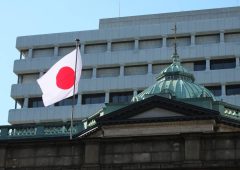Bank of England Warns Trade Barriers Threaten Global Stability
01.12.2024 13:00 1 min. read Kosta Gushterov
The Bank of England has raised alarms over escalating trade restrictions, warning they pose significant risks to global economic stability and inflation.
These barriers are driving up borrowing costs for households and businesses, adding pressure to already volatile financial markets.
The BoE highlighted a worrying decline in international financial cooperation, which it says could weaken the global system’s ability to handle future crises. Governor Andrew Bailey emphasized the growing threat of economic fragmentation, particularly for the UK, a nation heavily reliant on trade. While banks and households remain stable for now, the report flagged vulnerabilities like soaring public debt and unpredictable markets.
Tensions have also surfaced between the government and the BoE over regulation. Finance Minister Rachel Reeves accused the central bank of stifling growth, but Bailey dismissed this, insisting financial stability is essential. Still, the BoE plans to reduce the frequency of stress tests for banks starting in 2025.
The report also warned of market volatility fueled by trade uncertainties and inflation concerns. Hedge funds and non-bank financial entities were identified as potential weak points, with the risk of sudden asset sell-offs amplifying instability. Despite these challenges, UK banks are well-capitalized and prepared to handle shocks, supported by strategic adjustments in oversight.
-
1
U.S. PCE Inflation Rises for First Time Since February, Fed Rate Cut Likely Delayed
27.06.2025 18:00 1 min. read -
2
Key U.S. Economic Events to Watch Next Week
06.07.2025 19:00 2 min. read -
3
Gold Beats U.S. Stock Market Over 25 Years, Even With Dividends Included
13.07.2025 15:00 1 min. read -
4
U.S. Announces Sweeping New Tariffs on 30+ Countries
12.07.2025 16:30 2 min. read -
5
US Inflation Heats Up in June, Fueling Uncertainty Around Fed Cuts
15.07.2025 16:15 2 min. read
US Inflation Heats Up in June, Fueling Uncertainty Around Fed Cuts
U.S. inflation accelerated in June, dealing a potential setback to expectations of imminent Federal Reserve rate cuts.
Gold Beats U.S. Stock Market Over 25 Years, Even With Dividends Included
In a surprising long-term performance shift, gold has officially outpaced the U.S. stock market over the past 25 years—dividends included.
U.S. Announces Sweeping New Tariffs on 30+ Countries
The United States has rolled out a broad set of new import tariffs this week, targeting over 30 countries and economic blocs in a sharp escalation of its trade protection measures, according to list from WatcherGuru.
Key U.S. Economic Events to Watch Next Week
After a week of record-setting gains in U.S. markets, investors are shifting focus to a quieter yet crucial stretch of macroeconomic developments.
-
1
U.S. PCE Inflation Rises for First Time Since February, Fed Rate Cut Likely Delayed
27.06.2025 18:00 1 min. read -
2
Key U.S. Economic Events to Watch Next Week
06.07.2025 19:00 2 min. read -
3
Gold Beats U.S. Stock Market Over 25 Years, Even With Dividends Included
13.07.2025 15:00 1 min. read -
4
U.S. Announces Sweeping New Tariffs on 30+ Countries
12.07.2025 16:30 2 min. read -
5
US Inflation Heats Up in June, Fueling Uncertainty Around Fed Cuts
15.07.2025 16:15 2 min. read


